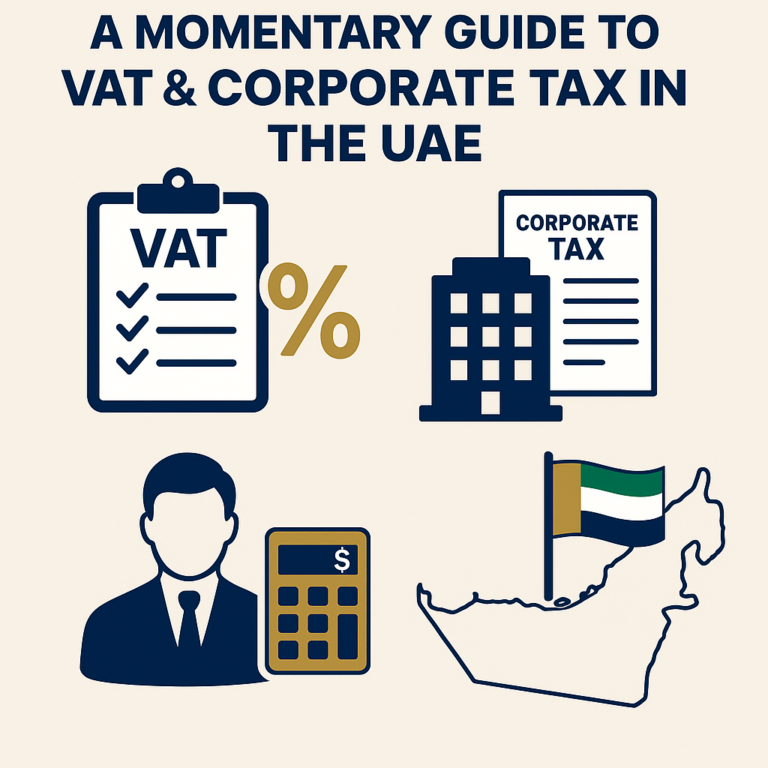As the UAE continues to evolve as a global financial and business hub, the country has introduced modern tax systems that align with international standards while maintaining a business-friendly environment. Two of the most significant taxes impacting businesses today are Value Added Tax (VAT) and the newly introduced Corporate Tax.
Whether you’re a startup, SME, or large enterprise, understanding these taxes is crucial for compliance and effective financial planning.
What is VAT in the UAE?
Launched: 1 January 2018
Regulator: Federal Tax Authority (FTA)
Value Added Tax (VAT) is a consumption-based tax applied at each stage of the supply chain. Businesses collect VAT on behalf of the government and remit it periodically through VAT returns.
Key Highlights:
Standard Rate: 5% on most goods and services.
Zero-Rated Items: Includes exports, international transportation, education, and healthcare services.
Exempt Supplies: Certain financial services and residential real estate.
Mandatory VAT Registration: Businesses with annual taxable supplies exceeding AED 375,000.
Voluntary VAT Registration: Available for businesses with turnover above AED 187,500.
VAT Compliance:
Quarterly or monthly VAT returns, depending on turnover.
Businesses must issue valid tax invoices, maintain accurate records, and submit returns on time.
Late filing or incorrect submissions may result in penalties.
Who Should Care?
Any business involved in the sale of goods or services, whether in the mainland or free zone, should evaluate their VAT obligations carefully. UAE Corporate Tax – A New Era for Businesses Effective From: 1 June 2023
Regulator: Federal Tax Authority (FTA) The UAE has introduced a federal Corporate Tax (CT) regime to support the country’s economic diversification and fulfill global commitments, such as the OECD’s Base Erosion and Profit Shifting (BEPS) initiative.
Key Corporate Tax Features:
Tax Rate: 0% on the first AED 375,000 of taxable income, and 9% thereafter.
Scope: Applies to UAE-based businesses, including mainland and free zone entities.
Exemptions:
o Income from employment
o Real estate investments by individuals
o Qualifying investment income
o Certain free zone entities (if they meet qualifying activity criteria)
Corporate Tax Compliance:
Registration: Mandatory for all taxable persons (including free zones).
Financial Statements: Must be prepared based on International Financial Reporting Standards (IFRS).
Annual Tax Returns: Required to be filed electronically within 9 months of the financial year-end.
Transfer Pricing Regulations: Applicable for related party transactions and require proper documentation.
Strategic Considerations:
Evaluate group structures to optimize tax efficiency.
Prepare for transfer pricing compliance with relevant documentation.
Align your bookkeeping and audit systems to meet FTA expectations.
| Feature | VAT | Corporate Tax |
| Effective From | 1 January 2018 | 1 June 2023 |
| Rate | 5% | 9% (above AED 375,000) |
| Applies To | Goods & Services | Business profits |
| Regulator | Federal Tax Authority (FTA) | Federal Tax Authority (FTA) |
| Filing Frequency | Quarterly/Monthly | Annually |
| Registration Threshold | AED 375,000 (turnover) | AED 375,000 (taxable income) |
How We Can Help
Navigating VAT and Corporate Tax laws in the UAE can be complex — but you don’t have to do it alone. Our team of experienced tax professionals can assist you with:
Tax registration and deregistration
VAT and CT advisory and planning
Filing accurate and timely returns
Transfer pricing and documentation
Managing audits and FTA correspondence


